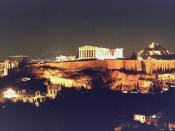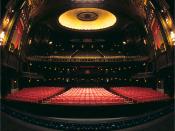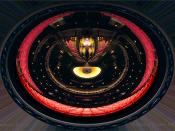The origins of drama
TWENTY-FIVE HUNDRED YEARS AGO, two thousand years before Shakespeare, Western theatre was born in Athens, Greece. Between 600 and 200 BC, the ancient Athenians created a theatre culture whose form, technique and terminology have lasted two millenia, and they created plays that are still considered among the greatest works in theatre. Their achievement is truly remarkable when one considers that there have been only two other periods in theatre history which approached the greatness of ancient Athens -- Elizabethan England and the Twentieth Century. The great playwright of Elizabethan England was Shakespeare, but Athens produced at least five great playwrights. The Twentieth Century produced thousands of fine plays and films, but their form and often their content were based on the innovations of the ancient Athenians.
The Cult of Dionysus
The theatre of Ancient Greece evolved from religious rites which date back to at least 1200 BC.
At that time Greece was populated by primitive tribes. In northern Greece, in an area called Thrace, a cult arose that worshipped Dionysus, the god of human and agricultural fertility. The Cult of Dionysus practiced ritual celebrations which included intoxication, orgies, human and animal sacrifices, and hysterical rampages by women called maenads.
The cult's most controversial practice involved uninhibited dancing and emotional displays that created an altered mental state. This altered state was known as ecstasis, from which the word ecstasy is derived. Dionysiac, hysteria and catharsis also derive from Greek words for emotional release. Ecstasy was an important concept to the Greeks, who would come to see theatre as a way of releasing powerful emotions.
Though it met with resistance, the cult spread south through the tribes of Greece over the ensuing six centuries. During this time the rites of Dionysus became mainstream and more civilized. By...



Comment
Although this article wasn't exactly on the most interesting topic, I still enjoyed reading this piece of work.
6 out of 6 people found this comment useful.